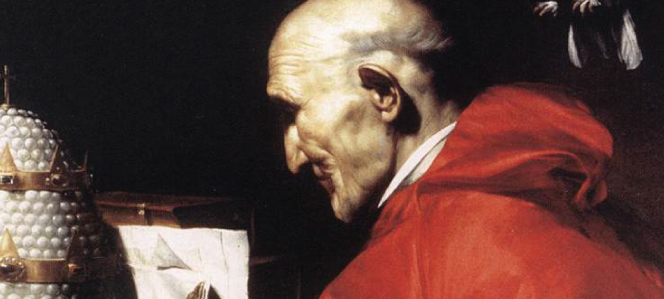St. Gregory the Great was born in Rome around the year 540 AD. He was the member of a privileged family and, as such, had many opportunities available to him. However, young Gregory eschewed all this and entered monastic life, accepting the spiritual way of poverty, chastity and obedience. Gregory might have intended to withdraw from the world, but Providence would have none of this. Gregory was named the Pope’s legate to the imperial court of Constantinople. The Rome of Gregory’s day was a mere vestige of its former glory, so the intrigues and wonders of the New Rome, Constantinople, must have made quite an impression on this papal ambassador.
In the year 590, Gregory was chosen to serve the Church as pope, and during his tenure as Bishop of Rome he sought to accomplish the reform and renewal of the mother church of all the churches in that city and in the world. His efforts would prove critical to the survival of civilization in Europe. As the power of the Roman Empire in the West was rapidly fading, Gregory would assure that the Church would endure as a living source of creativity and cohesion for the peoples of Europe.
Perhaps the greatest spiritual lesson for us in the witness of St. Gregory is discerned in his vocation. Gregory correctly discerned that the Lord had chosen him for monastic life, but God would beckon Gregory beyond his own expectations in regards to how his vocation would serve the Lord’s will and purposes. Called to the austere life of a monk, this commitment would take him to the glittering court of the emperor and later to the chair of Saint Peter. The lesson? God calls and then sets before us a path that does not by any measure of necessity have to conform to our expectations. This is the demand and the mystery of every state of life.
As a culture we labor under the assumption that a vocation is best illuminated as a kind of decision, a choice by which we decide for ourselves who we are and what we should do. On the surface, the pretense of this might console us and make us feel that in a world that is so evidently outside of our control, at the very least we can forge for ourselves a personal destiny. However, authentic vocation is not so much about our decision but God’s. It is only when our lives are in conformity with God’s will that we truly learn who we are and what we must do.
St. Gregory accepted God’s decision for his life, and as a result his life delivered more to him and to the world than he could have possibly imagined.
Therefore, it seems to me, the spiritual challenge he sets before us today is this: Are we ready and willing to accept God’s decision for our own lives?
